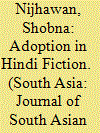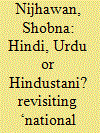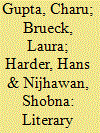|
|
|
Sort Order |
|
|
|
Items / Page
|
|
|
|
|
|
|
| Srl | Item |
| 1 |
ID:
175486


|
|
|
|
|
| Summary/Abstract |
This article examines gendered lives in vernacular fiction by focusing on the topic of child adoption as fictionalised in Hindi literature in late colonial India (1920s). It argues that non-conformance and non-normativity dominated the short stories selected for this article. The feature of non-conformance towards normative assumptions in middle-class Hindu society also concerned Hindi literary realism of the time more generally, especially when presenting a diversity of intergenerational relationships between women, men, children and youth within the family setting, as well as beyond. The narratives discussed here show how social norms set by caste, class, gender, religion and biology were surpassed when it came to imagined family constellations in the late colonial period.
|
|
|
|
|
|
|
|
|
|
|
|
|
|
|
|
| 2 |
ID:
143317


|
|
|
|
|
| Summary/Abstract |
Asking how the nationalist intelligentsia and Hindi literati sought to interact with and shape the new medium of radio in a period of time that witnessed the establishment of All India Radio’s Lucknow station in 1938, this article embeds colonial discussions of radio broadcasting into the cultural, literary and linguistic debates over Hindi, Urdu and Hindustani. The vibrant debate on the standardisation of Hindi, set against the background of All India Radio policies, is discussed from the perspective of those literary actors and institutions that envisioned diverse oral forms of Hindi and Hindustani for the rural and urban population residing in the Hindi belt and the rest of India. In addition, the article compares the radio broadcasting language to other contributions published in Hindi to show how languages operated not only in parallel but also in intersecting literary spheres. The article shows that language debates over radio broadcasting functioned as a site to probe the flexibility of what was to be officially projected as the language of the nation-to-be.
|
|
|
|
|
|
|
|
|
|
|
|
|
|
|
|
| 3 |
ID:
175481


|
|
|
|
|
| Summary/Abstract |
This collection brings together nine essays, accompanied by nine short translations, that redraw the boundaries of literary histories both temporally and spatially. The essays, rooted in the humanities and informed by interdisciplinary area studies, explore multiple linkages between forms of print culture, linguistic identities and diverse vernacular literary spaces in colonial and post-colonial South Asia. The essays and translations foreground complex and politicised expressions of gender and genre in fictional and non-fictional print materials and thus draw meaningful connections between the vernacular and literature, the everyday and the marginals, and gender and sentiment. Collectively, they expand vernacular literary archives, canons and genealogies, and push us to theorise the nature of writing in South Asia.
|
|
|
|
|
|
|
|
|
|
|
|
|
|
|
|
| 4 |
ID:
155913


|
|
|
|
|
| Summary/Abstract |
In analysing a campaign launched by the Indian Tea Market Expansion Board in a Hindi literary periodical, this article seeks to read tea advertisements within the cultural history of gendered lives and nationalism in the decade leading up to Indian Independence. More specifically, it explores how multiple versions of feminized Indian modernity came to feature in the construction of black tea as a healthy, social, and national beverage. As the habit and custom of tea drinking was not common amongst the Indian population of the first half of the twentieth century, the advertisements focused on the creation of a culture of ‘proper’ tea preparation and ‘correct’ consumption. Not only did the middle-class woman and her family feature centrally in these advertisements; aristocratic and working women as well as movie actresses were all associated with the beverage drunk to reenergize and savour. While the advertisements addressed middle-class society and consciousness, this article argues that they did so by also drawing on, and not distancing from, diverse class, caste, and professional contexts.
|
|
|
|
|
|
|
|
|
|
|
|
|
|
|
|
|
|
|
|
|